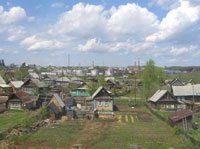Social gap between Moscow and the rest of Russia becomes immense
The gap between the lifestyle, opinions and outlooks of Muscovites and residents of smaller towns becomes larger and larger, sociologists of Levada Center say in their recent study. There are hardly any people in Moscow who suffer from the shortage of money on food. The situation is completely different in smaller towns. The smaller a town, the more hungry people it has living there. The living standard in Russia grows in Moscow and other large cities. Their residents can easily afford a trip abroad. The number of such holiday-makers in smaller towns is very low.

Sociologists of Levada Center conducted their studies in July and August to find out the interconnection between the type of settlement, lifestyle and outlook of Russians. Moscow stands apart at this point.
For example, 59 percent of Muscovites say that their family income is high – more than 22,000 rubles (about $1,000) a month. Only nine percent of people receive such income in smaller towns. The number of people receiving high family incomes in other large cities of Russia makes up about 24 percent, whereas this figure fluctuates between 11-17 percent in smaller towns.
“The level of income plays the main role in the shaping of lifestyle. For example, there is an ordinary village guy, who wants to see Paris and die. He makes 5,000 rubles ($200) a month, which is barely enough for his essential needs. The guy has to grow vegetables and live with his dreams about Paris instead,” senior analyst of consulting company KorKon, Abram Kats said in an interview with the Vzglyad newspaper.
People with higher income can afford trips to foreign countries (40 percent in Moscow and 3 percent in smaller towns), and they never suffer from the lack of food. Less than one percent of Muscovites acknowledged that their earnings were not enough even on essential foodstuffs, whereas about 48 percent of those from smaller towns and villages constantly live under such conditions.
People living in smaller towns read press more actively. About 30 percent of people residing in towns having the population less than 100,000 read daily newspapers. The number of such readers in villages makes up 22 percent. Only 16 percent of the polled Muscovites said that they read newspapers regularly.
“There is nothing surprising about the fact that there is a higher percentage of people reading newspapers in smaller towns. The development of Internet technologies is a lot lower there. They traditionally buy fresh newspapers in kiosks. Muscovites prefer to read online versions of print newspapers,” Abram Kats said.
Moscow and the countryside probably have only one thing in common when it comes to their attitude to the USA. “In general – negatively” was the response provided by 49 percent of the polled Muscovites. Thirty-two percent of the polled gave the same answer in other large cities of Russia, with smaller towns and villages following with 31 percent.
Subscribe to Pravda.Ru Telegram channel, Facebook, RSS!

